
Economics_-_New_Ways_of_Thinking
.pdf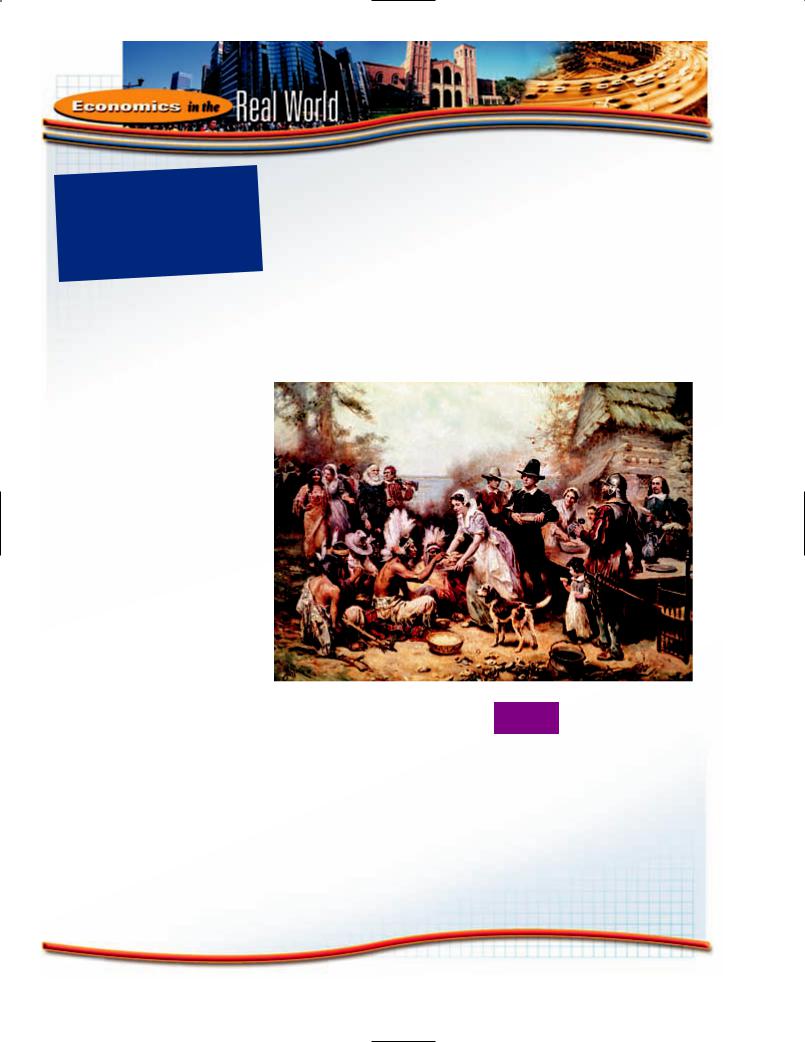
What???Savedthe
Pilgrims?
Private property is one of the features of free enterprise.
Many of the advocates of free enterprise argue that without private property, free enterprise could not produce as much wealth as it does.
Private property is not without its critics, though. Some people argue that private property breeds greed and selfishness. Common property—property held in common by the community—motivates people to be more civic minded, peaceful, and caring, they say. The advocates of private property retort that this notion of common property is idealistic and wrong. The truth is, they say, that common property often leads to poverty and unhappiness.
With this background, consider the Pilgrims in the early 1600s. When the Pilgrims left the Old World, they formed a partnership in a joint-stock company with some London merchants. When the Pilgrims landed off the coast of Massachusetts in 1620, they followed the advice of the company and declared that all pastures and produce would be common property. The result was chaos and starvation; after the first winter, half the colonists were dead.
Bad weather is often blamed for what happened to the Pilgrims, but
the governor of the Plymouth colony, William Bradford, believed otherwise. He thought it had a lot to do with the fact that the Pilgrims held common property instead of private property. Bradford, therefore, assigned every family in the colony a private parcel of land, on which the family could produce food that it sold for profit. In his diary, Bradford wrote that privatizing the land “had very good success for it made all the hands very indus-
trious, as much more corn was planted than otherwise would have been.” He also remarked on how unsuccessful the common property scheme had turned out to be when he said, somewhat philosophically, that it had proved the “vanity of that conceit of Plato’s . . . that the taking away of [private] property and bringing community into a commonwealth [of common property] would make them happy and flourishing.” It seemed that common property, far
from making people happy and flourishing, had instead made them poor and hungry.
Some historians now say that it was probably Bradford’s decision to turn common property into private property, more than a change in the weather, that produced the first plentiful harvest in the Plymouth colony—a plentiful harvest that was subsequently celebrated as Thanksgiving.
THINK To get an idea of how ABOUT IT private property affects
incentives, consider two settings. In the first setting, you and five of your friends share the ownership of a car. In the second setting, you are the only owner of the car. In which setting are you more likely to take care of the car (for example, to make sure it is clean and in good running order)? Explain your answer.
64 Chapter 3 Free Enterprise
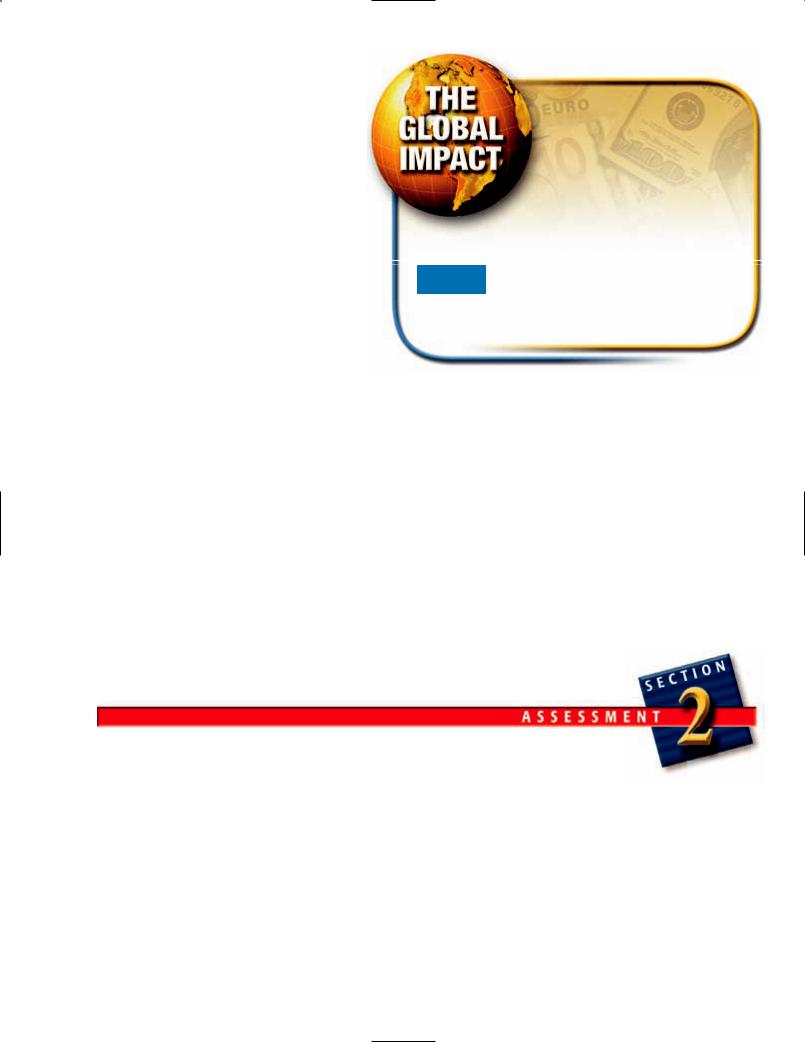
develop? Yes, ABC will be more likely to develop a comedy than a crime show.
Let’s summarize what happened:
•The people at home decide what they want to watch on television.
•Many more people watch the NBC comedy show (giving it high ratings) than the CBS crime show (which gets low ratings).
•Companies pay more to advertise on high-rated shows than low-rated shows, so NBC earns profits on its Thursday show and CBS takes losses.
•NBC realizes it has a winning show, so it keeps the comedy show on the air. CBS realizes it has a losing show, so it takes the crime show off the air.
•ABC, on the sidelines, decides to copy NBC instead of CBS.
You recall that resources consist of land, labor, capital, and entrepreneurship. When CBS decides to take its crime show off the air and replace it with a comedy show, what happens to the resources that were previously used to produce the crime show? An economist would say the resources are being reallocated—moved from one place to another, or used differently. Some of the resources used to produce the crime show— the people who worked on the show, the cameras used to film the show, the accountants who kept the books—will probably be used to work on a comedy show instead of a
Economic Freedom
According to the World Bank, from 1997 to 2005 the number of people living in countries with economic freedom increased 32
percent, and the number of people living in countries with little economic
freedom fell 38 percent.
If the trend toward greater economic globalization continues, do you think a
larger or smaller percentage of the world’s population will experience freedom?
losses. Profit is like a big magnet: it pulls resources toward it. Loss is like a big wind: it pushes resources away.
 In the early days of the VCRs, DVD players, personal calculators, and personal computers, profits were relatively high for the relatively few companies that produced the new products. This “high profit” attracted competitors. It was as if the high profit were saying, “Look, I’m over here, come and get me.” Soon, numerous companies were producing VCRs, DVD players, calculators, and personal computers, instead of only few. As a result, the
In the early days of the VCRs, DVD players, personal calculators, and personal computers, profits were relatively high for the relatively few companies that produced the new products. This “high profit” attracted competitors. It was as if the high profit were saying, “Look, I’m over here, come and get me.” Soon, numerous companies were producing VCRs, DVD players, calculators, and personal computers, instead of only few. As a result, the
Defining Terms
1.Define:
a.profit
b.loss
Reviewing Facts and
Concepts
2.Explain how profits and losses affect where resources will be used.
3.If a business is currently earning high profits producing lamps, what are
other firms that observe this fact likely to do? Explain your answer.
4.If price is $40, number of units sold is 450, and average cost is $33, what is the profit?
5.If average cost is $423, price is $399, and the number of units sold is 23, what is the loss?
Critical Thinking
6.Many people think that profit benefits only the person who earns it; in other words, profit provides no social function.
Do you agree or disagree? Explain your answer.
Section 2 Profit and Loss in Free Enterprise |
65 |
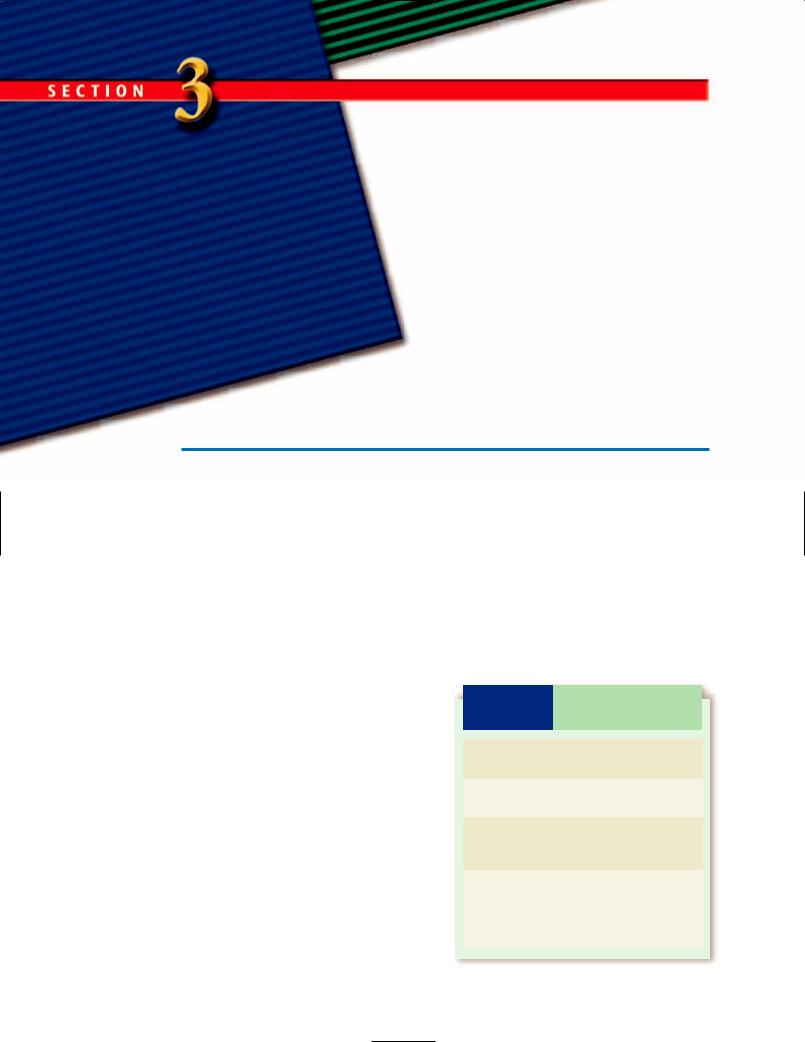
The Ethics of the
Free Enterprise
System
Focus Questions
What are some of the qualities or characteristics of an ethical economic system?
What are some of the freedoms in free enterprise?
What economic principles are stated in the Bill of Rights, the Constitution, and the Declaration of Independence?
What are some of the responsibilities people have in a free enterprise system?
Key Term
ethics
ethics
The principles of conduct, such as right and wrong, morality and immorality, good and bad.
Ethics and Free Enterprise
Ethics consists of the principles of conduct, such as right and wrong, morality and immorality, good and bad. We often evaluate a person as being ethical or not. Can we do the same thing for an economic system? For example, can we determine whether the free enterprise system is an ethical economic system? Another way of approaching this question is to ask what characteristics or qualities would the free enterprise system need to have to be an ethical system. What goals would it need to meet? (See Exhibit 3-3.)
People Can Choose
First, the supporters of free enterprise state that an ethical economic system allows individuals to choose their own occupations or professions. An ethical system, they say, does not force people to do jobs or tasks that they would rather not do. On this count, the supporters of free enterprise argue that it is an ethical system, because no one is forced to work at a job he or she does not want. People are free to choose the type of work they want to do.
A Variety of Products
Second, an ethical economic system produces the goods and services preferred by both the majority and the minority. The supporters of free enterprise argue that under that economic system, if the majority of the people want to buy cars that are light colored and medium sized, with CD players, then manufacturers will produce that kind
E X H I B I T 3-3 An Ethical Economic System
1.Allows individuals to choose their own occupations or professions
2.Produces goods and services preferred by both the majority and the minority
3.Rewards or punishes producers based on how well or poorly they respond to the buying public
4.Supports the right of the individual to be free, including the freedom to acquire property, work where you choose, and start your
own business
66 Chapter 3 Free Enterprise
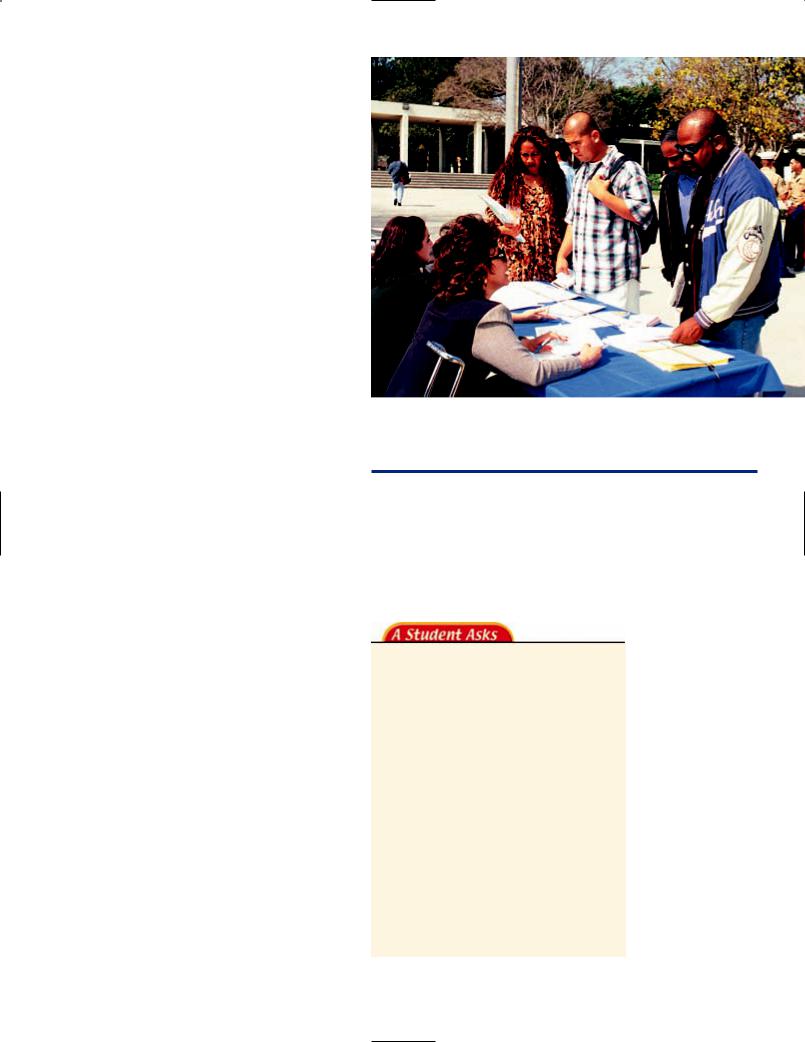
of car. (After all, they do not want to produce goods that consumers are not willing to buy.) If a few people want big cars instead of medium-sized cars, then it is likely that some big cars will be produced, too. If other people want small cars, some small cars will probably be produced.
Think of free enterprise at work in the restaurant business. In most U.S. cities of moderate size, many different types of restaurants serve a particular style of food: home cooking, fast food, and ethnic foods, for example. A wide variety of goods and services are available because free enterprise responds both to the majority and to minorities.
Rewards Depend on Performance
Third, an ethical economic system rewards (or punishes) producers according to how well (or poorly) they respond to the preferences of the buying public. Free enterprise fits this description. Sellers that continue to give consumers what they want to buy in terms of type of good, quality of good, and price of good will likely earn profits and stay in business. Those sellers that do not respond to public preferences end up taking losses and going out of business.
Numerous Freedoms
Fourth, the proponents of free enterprise argue that no economic system can be ethical if it limits people’s freedom. In free enterprise, they say, people have numerous freedoms: the freedom to work where they want to work, the freedom to start their own businesses if they want, the freedom to acquire property, the freedom to buy and sell the goods they want to buy and sell, and even the freedom to fail.
 Suppose Harris Jackson takes his entire savings and opens a shoe store. Six months later, Harris shuts down his business and declares bankruptcy. His problem was that few people wanted to buy shoes from him.
Suppose Harris Jackson takes his entire savings and opens a shoe store. Six months later, Harris shuts down his business and declares bankruptcy. His problem was that few people wanted to buy shoes from him.
Businesses close in the U.S. free enterprise system every day. Free enterprise gives us the freedom to spend our money as we
These students are learning about career possibilities. Why is this something they can do in a free enterprise economy, but not in some other economic systems?
choose, and sometimes this freedom results in business failures for other people. Individuals must accept the consequences of their decisions. Free enterprise does not offer any guaranteed outcomes; rather, it offers freedom.
QUESTION: Having the freedom to do something is different from having the ability to do it. What use is the freedom to start your own business if you do not have the money to start the business? Without the ability, the freedom seems useless.
ANSWER: No economic system can provide people with the ability to do anything, such as write a great novel, run the four-minute mile, or be a successful entrepreneur. However, economic systems may or may not give individuals the opportunity to realize their potential.
The supporters of free enterprise argue that free enterprise does provide
Section 3 The Ethics of the Free Enterprise System |
67 |
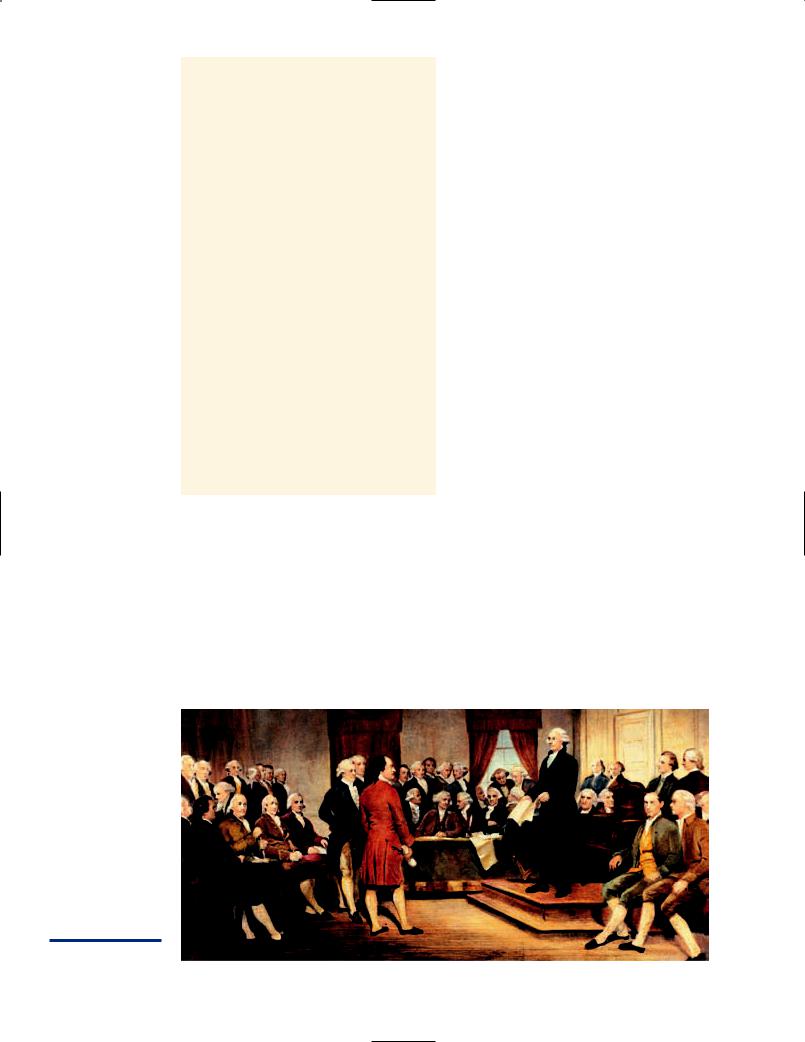
The signing of the Constitution in Philadelphia, in 1787, helped establish the principles of free enterprise in the United States. What other key documents helped solidify free enterprise as the economic system for the young nation?
people with the opportunity, or freedom, to start a business. They also argue that free enterprise gives individuals the opportunity to strengthen and develop their abilities. Suppose a person does not currently have the money or the knowledge to open up her own business, and she is currently working at a low-wage job. Is she destined never to start her own business? Not necessarily.
She can begin today doing those things that are necessary to start her own business in the future. These steps may include working hard in her current job, saving some money, attending school to learn about the business she wants to start, and obtaining a business loan. The economic history of the United States, under free enterprise, is full of stories of people who were poor and uneducated (and, in many cases, did not know the English language), yet went on to start their own businesses and become economically successful.
Economic Principles in
Key Documents
The Constitution, the Bill of Rights, and the Declaration of Independence hold a special place in the hearts and minds of most Americans. It can also be argued that these three documents have a special significance to free enterprise: each document has free
enterprise economic principles contained within it.
Remember that private property, choice, and competition are important features of free enterprise and that the essence of free enterprise is freedom. It is not difficult to find evidence that the Constitution, the Bill of Rights, and the Declaration of Independence are also about private property, choice, competition, and freedom, among other things.
Bill of Rights
The Bill of Rights, for example, notes that “private property [shall not] be taken for public use, without just compensation.” In other words, if the government wants some land you own in order to put in a road, it cannot simply take that land from you. It must justly compensate, or pay, you for that land. This fact shows the high regard for private property in the Bill of Rights.
Declaration of Independence
The signers of the Declaration of Independence listed many complaints against the king of Great Britain, George III. One complaint was that the king had prevented the 13 colonies from “trad[ing] with all parts of the world.” Surely the signers of the Declaration of Independence were angry at King George III for not allowing them to practice free trade—an essential ingredient of free enterprise—with the rest of the world.
68 Chapter 3 Free Enterprise

Did the Airlines
Overlook the
Overbooking
Problem?
??????????????????
Suppose the jet for the flight from Atlanta, Georgia, to
Chicago, Illinois, can hold 150 passengers. How many tickets will an airline sell? The answer is “more than 150,” because the airlines know that some people will cancel their flight at the last moment or won’t turn up at the airport. In other words, the airlines “overbook”
flights—they sell more tickets than seats available.
Because of overbooked flights, every now and then more people will turn up at the airport (to take a flight) than are seats available. For example, 155 people may turn up with reservations for 150 seats. In the past, airlines would often “bump” some passengers to the next flight. The bumped passengers were usually angry that they, and not someone else, had been bumped.
Today the airlines don’t bump passengers. What they do is ask passengers if they would be willing to take an “upgrade” on a later flight (fly first class) or take a $200
voucher (or more) on any of their flights in exchange for taking a later flight. This new system of dealing with overbooked flights has resulted in much more satisfied flying customers.
Who came up with the system of offering overbooked passengers compensation (of one form or another) if they would take a later flight? Was it the president of an airline? Was it the airline ticket agents, the people who had to deal with the disgruntled bumped pas-
sengers? No, it was an economist, Julian Simon (1932–1998). In this regard, Simon behaved as an entrepreneur: he figured out a new and better way to do something.
Simon’s plan to deal with overbooked flights came to him as he was shaving one day. He wrote the presidents of several airlines, and each told him that his was a good idea, but that they weren’t going to implement it.
One day, Alfred Kahn, also an economist, was appointed chairman of the Civil Aeronautics Board. Simon wrote him about his plan for dealing with overbooked flights. Kahn liked the idea and strongly suggested that the airlines adopt it. They did. The rest, as they say, is history.
THINK The Simon plan ended ABOUT IT up being a plan that
benefited the airlines and flying customers. Airline executives admitted that the Simon plan made it easier for them to overbook flights (and lower their costs because it is costly to fly an airplane half full) while at the same time maintaining a happy customer base. If the Simon plan was as good for the airlines as they now say, why didn’t an airline executive come up with the plan?
The Constitution
Article 1, Section 8, of the U.S. Constitution says that “no tax or duty shall be laid on articles exported from any State.” The Constitution favors preserving competition; if states had been allowed the right to
impose a tax on each other’s goods, competition within each state would have been lessened. To preserve competition—an important feature of free enterprise—it was important to deny states the right to tax each other’s goods.
Section 3 The Ethics of the Free Enterprise System |
69 |
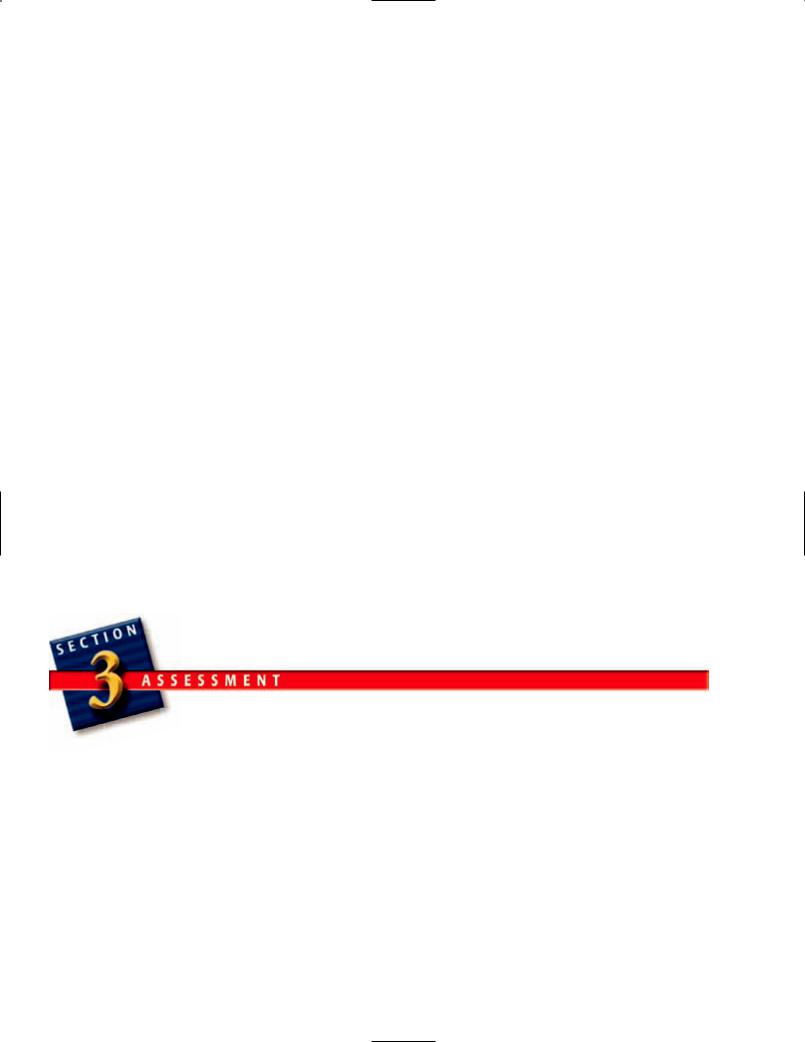
Economic Rights and
Responsibilities in a Free
Enterprise Economy
People have certain rights in a free enterprise economy, but rights rarely come without responsibilities. What are the responsibilities of persons in a free enterprise economy?
Open Disclosure
Many people argue that the right to voluntary exchange comes with the responsibility of giving the other person accurate information about what is being exchanged. Suppose Steve wants to exchange (sell) his 12-year-old house for the $270,000 that
Roberto is willing and able to pay for it. In a free enterprise economic system, Steve and Roberto have the economic right to complete this exchange, but Steve also has
the responsibility to tell Roberto the particulars about the house. For example, if the house has termites or faulty plumbing, Steve should tell Roberto this fact. In other words, Steve has the responsibility of truthfully relating to Roberto the facts about the product he is considering buying. This disclosure is a matter of simple fairness or justice.
Obeying the Law
Consider another economic right in a free enterprise economy: the right to private property. The responsibility associated with this right is the responsibility of using one’s property only for legal purposes; it is a responsibility to respect and abide by the law. Suppose Isabella owns a car. She certainly has the right to use that car to drive to and from work, go on vacations, pick up friends at school, and so on. It is also the case, however, that Isabella has some responsibilities. For example, she has the responsibility of obeying the speed limit, knowing and following all other traffic laws, and driving carefully.
Being Truthful
Finally, consider the economic right to compete in a free enterprise system. The responsibility attached to this right is to compete in a truthful, legitimate manner. If both Tushar and Yolanda own pizzerias in town and are thus in competition with each other, both have the responsibility to be truthful about the other’s business. Tushar should not lie to his customers that Yolanda’s pizzeria was cited by the government health examiner for having insects in the kitchen. Yolanda must not lie and say that Tushar uses less cheese in his pizzas than he actually does.
Defining Terms
1. Define ethics.
Reviewing Facts and
Concepts
2.“Under free enterprise, only the majority of people can buy the goods they prefer; the minority always end up buying those goods they would prefer not to buy.” Do you agree or disagree with this statement? Explain your answer.
3.“Free enterprise guarantees economic success.” Do you agree or disagree with this statement? Explain your answer.
4.Explain what responsibility goes with each of the following rights:
a.the right to voluntary exchange
b.the right to private property
c.the right to compete
Critical Thinking
5.“In a free enterprise system, it is possible that more trashy novels will be published and sold than serious, soulinspiring works of literature. Any system that produces this outcome can’t be ethical.” Do you agree or disagree with this statement? Explain your answer.
70 Chapter 3 Free Enterprise
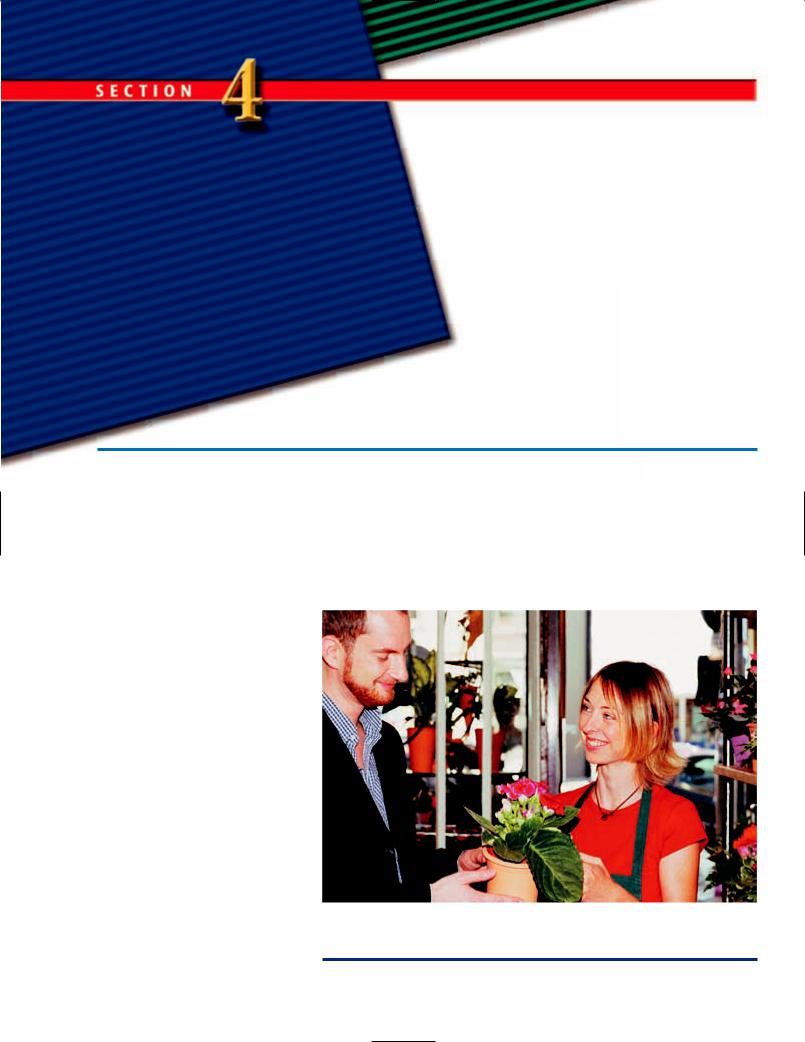
Entrepreneurs
Focus Questions
What is an entrepreneur?
How might the actions of an entrepreneur benefit you?
What impact would a law that limited profits have on future entrepreneurs?
Why are entrepreneurs willing to risk their time and money?
Key Term
entrepreneur
Imagine Being an
Entrepreneur
An entrepreneur is a person who has a special talent for searching out and taking advantage of new business opportu-
nities, as well as developing new products and new ways of doing things. To get some idea of what being an entrepreneur is like, try to imagine you are one.
New Products
Think about the second task of an entrepreneur: developing new products. What new product can you think of developing? Most of us are accustomed to thinking in
entrepreneur
A person who has a special talent for searching out and taking advantage of new business opportunities.
New Opportunities
How would you search out new business opportunities? No book in the library can give you a personalized answer. Even if such a book existed, by the time it was published and found its way into the library, the business opportunities listed in it would no longer be new. Most people, when confronted with the task of finding a new business opportunity, end up scratching their heads. Most people are not entrepreneurs; entrepreneurs are a tiny minority of the population.
Entrepreneurs feel that they have new and better ways of satisfying customers.
What sort of business might you want to start someday?
Section 4 Entrepreneurs |
71 |
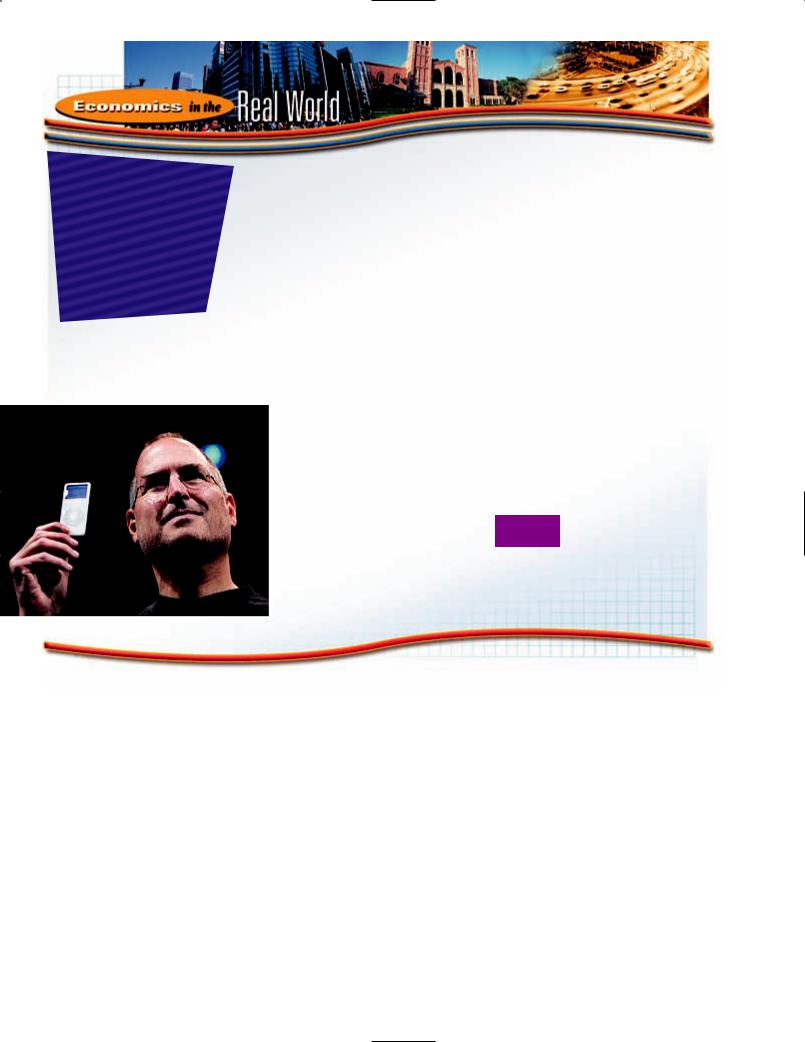
Why Is ? the iPod Scrollwheel
So Slick?
iPod users will tell you that they like their iPods for many rea-
sons. It’s sleek looking, it holds
thousands of songs, it’s lightweight, and you can take it anywhere. For many iPod users, one of the features they like best is the scrollwheel. It’s touch sensitive and has a rather slick, lightning fast feel about it.
“Buy it, use it, break it, fix it, trash it, change it, melt—upgrade it.”
—from an iPod commercial (“Technologic” by Daft Punk)
Interestingly enough, the first generation of iPods didn’t come with the current touch-sensitive scrollwheel. The first scrollwheel on the iPod was developed by Apple. It physically rotated and was not touch sensitive.
Apple wanted a better scrollwheel, so it turned to a company called Synaptics. (Synaptics makes touchpads for laptop computers.) Synaptics came up with the touchsensitive, slick, lightning fast scroll-
wheel that iPods use today. In this regard, Synaptics was acting as an entrepreneur: it was developing new ways of doing things.
The new scrollwheel came with four touch-sensitive buttons above it. These buttons were used for various playback functions. When Apple was in the process of designing the iPod Mini, it decided that those buttons had to go because there just wasn’t enough room for them. Synaptic then came up with new scrollwheel with the former four buttons placed around the periphery of the scrollwheel. Now the scrollwheel could perform two functions: it could be used to scroll for songs and for playback control too.
We tend to think of an entrepreneur as a per-
son; however, business firms can behave “entrepreneurially” as well. What business firms can you point to that act entrepreneurially?
terms of products that already exist, such as televisions, computers, or cars. Thinking of a new product is not easy, especially one with a high potential for sales.
New Processes
As for the third task of an entrepreneur— developing new ways of doing things—ask yourself what things people would want to do differently. Then ask how people could do these things differently. You’ll probably find that these questions are difficult to answer. Indeed, entrepreneurs must overcome obstacles, solve problems, and answer challenging questions.
Who Benefits?
If an entrepreneur succeeds in coming up with an idea for a new product, develops and produces it, and then offers it for sale, how are we made better off? Think of entrepreneurs whose new products have helped you. For example, think about Steve Jobs, one of the developers of the personal computer and the iPod. Was your life affected positively or negatively as a result of his entrepreneurship? Most would say we benefited from the introduction of, say, the personal computer. Entrepreneurs, it would seem, play an important role in society by taking risks to develop new products or new
72 Chapter 3 Free Enterprise

ways of doing things that benefit the public. From a consumer’s point of view, having more risk-taking entrepreneurs in a society likely means having more choices of goods and services in that society.
 On August 1, 1981, MTV was launched. The originators of MTV were entrepreneurs: They were one of the first to see that a market existed for combining one product (music) with another product (television). The first music video shown on MTV was “Video Killed the Radio Star” by the Buggles. The first music video shown on MTV Europe was “Money for Nothing” by Dire Straits. Choosing “Money for Nothing” was done tongue-in- check by MTV executives because the song mentions MTV—“Now look at them yoyos, that’s the way you do it, you play the guitar on the MTV.”
On August 1, 1981, MTV was launched. The originators of MTV were entrepreneurs: They were one of the first to see that a market existed for combining one product (music) with another product (television). The first music video shown on MTV was “Video Killed the Radio Star” by the Buggles. The first music video shown on MTV Europe was “Money for Nothing” by Dire Straits. Choosing “Money for Nothing” was done tongue-in- check by MTV executives because the song mentions MTV—“Now look at them yoyos, that’s the way you do it, you play the guitar on the MTV.”
Entrepreneurs,
Profit, and Risk
“You can’t get something for nothing.” This saying is certainly true for entrepreneurship. We can’t get people to risk their own time and money, to try to develop new products, and to innovate unless they can potentially earn a profit. With this in mind, how would you respond to someone who says, “Look at that entrepreneur. He’s a billionaire; he’s earned high profits for years. We ought to pass a law that people can earn no more than 5 percent profit on anything they produce and sell”?
You may be inclined to agree, thinking that with a law that limited profits, you would be able to buy goods and services at
he author W. Somerset TMaugham wrote a short
story titled “The Verger.”
It can be found online at www.emcp
.net/verger. A verger is a man who takes care of the interior of a church. In the Maugham story, the vicar of a church fires the verger because he does not know how to read or write. The verger then sets out to find work. In the process, he becomes a successful entrepreneur. Read the story and find out just how the verger becomes an entrepreneur.
lower prices. Less profit for the billionaire entrepreneur, in other words, would simply mean more money in your own pocket.
Things don’t always work this way, however. If potential entrepreneurs knew that they could earn only a 5 percent profit at best, they might not be willing to take the risks necessary to become actual entrepreneurs. With fewer entrepreneurs, fewer new goods and services
and fewer innovations would be available for your benefit. Not all entrepreneurs are successful, of course. In fact, many entrepreneurs risk their time and money and end up with nothing. A
few do end up with millions or even billions of dollars. It is the prospect of millions or billions of dollars that motivates entrepreneurs to assume the risks inherent in entrepreneurship.
Reviewing Facts and |
Critical Thinking |
|
Concepts |
3. Economists speak of four |
|
1. |
What does an entrepre- |
categories of resources: |
|
neur do? |
land, labor, capital, and |
2. |
How might an entrepre- |
entrepreneurship. |
|
neur’s risk-taking activi- |
Suppose that country A |
|
ties benefit society? |
has much more land, |
labor, and capital than country B, but it has no entrepreneurs. Country B, however, has many entrepreneurs. In which country would you prefer to live, and why?
Section 4 Entrepreneurs |
73 |
